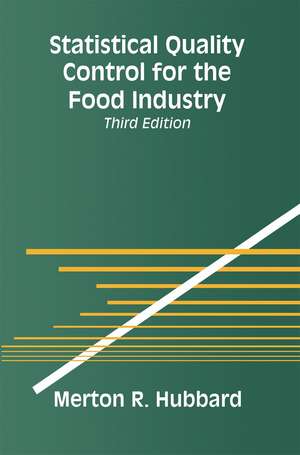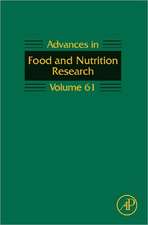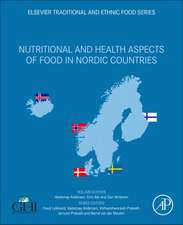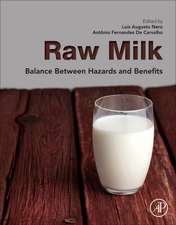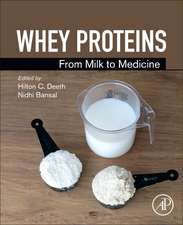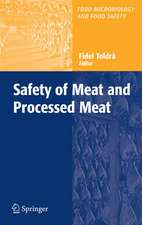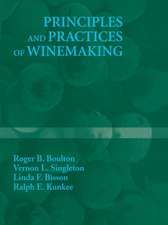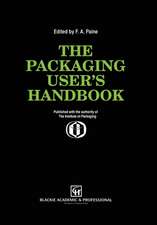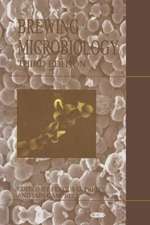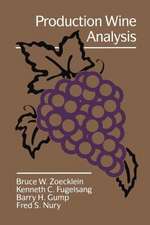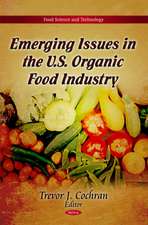Statistical Quality Control for the Food Industry
Autor Merton R. Hubbarden Limba Engleză Paperback – 24 sep 2012
This Third Edition maintains the strengths of the first and second editions while adding new information on Total Quality Management, Computer Integrated Management, ISO 9001-2002, and The Malcolm Baldrige Quality Award. There are updates on FDA Regulations and Net Weight control limits, as well as additional HACCP applications. A new chapter has been added to explain concepts and implementation of the six-sigma quality control system.
| Toate formatele și edițiile | Preț | Express |
|---|---|---|
| Paperback (1) | 1003.84 lei 6-8 săpt. | |
| Springer Us – 24 sep 2012 | 1003.84 lei 6-8 săpt. | |
| Hardback (1) | 958.38 lei 6-8 săpt. | |
| Springer Us – 30 iul 2003 | 958.38 lei 6-8 săpt. |
Preț: 1003.84 lei
Preț vechi: 1224.20 lei
-18% Nou
Puncte Express: 1506
Preț estimativ în valută:
192.08€ • 209.30$ • 161.86£
192.08€ • 209.30$ • 161.86£
Carte tipărită la comandă
Livrare economică 23 aprilie-07 mai
Preluare comenzi: 021 569.72.76
Specificații
ISBN-13: 9781461349440
ISBN-10: 1461349443
Pagini: 364
Ilustrații: XV, 343 p.
Dimensiuni: 155 x 235 x 25 mm
Greutate: 0.56 kg
Ediția:3rd ed. 2003. Softcover reprint of the original 3rd ed. 2003
Editura: Springer Us
Colecția Springer
Locul publicării:New York, NY, United States
ISBN-10: 1461349443
Pagini: 364
Ilustrații: XV, 343 p.
Dimensiuni: 155 x 235 x 25 mm
Greutate: 0.56 kg
Ediția:3rd ed. 2003. Softcover reprint of the original 3rd ed. 2003
Editura: Springer Us
Colecția Springer
Locul publicării:New York, NY, United States
Public țintă
ResearchDescriere
Specifically targeted at the food industry, this state-of-the-art text/reference combines all the principal methods of statistical quality and process control into a single, up-to-date volume. In an easily understood and highly readable style, the author clearly explains underlying concepts and uses real world examples to illustrate statistical techniques.
This Third Edition maintains the strengths of the first and second editions while adding new information on Total Quality Management, Computer Integrated Management, ISO 9001-2002, and The Malcolm Baldrige Quality Award. There are updates on FDA Regulations and Net Weight control limits, as well as additional HACCP applications. A new chapter has been added to explain concepts and implementation of the six-sigma quality control system.
Anyone involved in the production foods will find this book a valuable guide for assuring the safety and uniformity of food production through application of the latest techniques in process quality control. Specifically, this text can be used effectively by those skilled in the field for reference; by entry level technicians as a training aid; and by upper management to enhance their understanding of this highly specialized field. It can also be studied by operating and service departments to assist them in "total quality control" efforts.
This Third Edition maintains the strengths of the first and second editions while adding new information on Total Quality Management, Computer Integrated Management, ISO 9001-2002, and The Malcolm Baldrige Quality Award. There are updates on FDA Regulations and Net Weight control limits, as well as additional HACCP applications. A new chapter has been added to explain concepts and implementation of the six-sigma quality control system.
Anyone involved in the production foods will find this book a valuable guide for assuring the safety and uniformity of food production through application of the latest techniques in process quality control. Specifically, this text can be used effectively by those skilled in the field for reference; by entry level technicians as a training aid; and by upper management to enhance their understanding of this highly specialized field. It can also be studied by operating and service departments to assist them in "total quality control" efforts.
Cuprins
1 Introduction.- Variability.- Quality Control Programs.- Problems with Tool Selection.- Quality Control Tools.- 2 Food Quality System.- The Formalized Quality System.- Quality System Guidelines.- Malcolm Baldridge National Quality Award.- Total Quality Management.- Team Quality Systems.- Computer Network Quality Systems.- Summary.- 3 Control Charts.- The Importance of Charting.- Procedure for Constructing X-Bar and R Charts.- Procedures for Constructing Attribute Charts.- 4 Fundamentals.- Analysis of Data.- Probability.- Binomial Distribution.- The Normal Distribution.- Distribution of Sample Means.- Normal Approximation to the Binomial Distribution.- t-Distribution.- Confidence Limits for the Population Mean.- Statistical Hypotheses—Testing Hypotheses.- Distribution of the Difference Between Means.- Paired Observations.- F-Distribution.- Analysis of Variance.- Two Criteria of Classification.- 5 Sampling.- Sampling Plans.- Why Sample?.- Samples from Different Distributions.- Sample Size.- How to Take Samples.- Types of Samples.- Sampling Plans.- Types of Inspection.- Classes of Defects.- Sampling Risks.- Selection of Population to be Sampled.- Selection of Sample Frequency and Location.- Hazard Analysis Critical Control Point.- Attribute Sampling Plans.- 6 Test Methods.- General Analysis.- Special Instrumentation.- Microbiology.- Sensory.- 7 Product Specifications.- 8 Product Capability.- Capability Index.- Benchmarking.- 9 Process Control.- Chart Patterns.- Using the Control Chart as a Quality Management Tool.- 10 Sensory Testing.- The Senses.- Sensory Testing Methods.- Types of Panels.- Selection and Training.- 11 Net Content Control.- Evaluation of Net Content Performance.- Interpreting Net Content Control.- Procedures for Setting Fill Targets.- 12 Design of Experiments.- Elimination of Extraneous Variables.- Handling many Factors Simultaneously.- Full Factorial Designs.- Fractional Factorial Designs.- Response Surface Designs.- Mixture Designs.- Experimental Design Analysis by Control Chart.- 13 Vendor Quality Assurance.- Vendor-Vendee Relations.- Specifications for Raw Materials, Ingredients, Supplies.- Quality Assurance of Purchased Goods.- Selecting and Nurturing a Supplier.- Packaging Supplier Quality Assurance.- Supplier Certification Programs.- 14 Implementing a Quality Control Program.- Management Commitment.- Getting Started.- An In-House Program.- Team Quality Systems.- Stepwise Procedures for Team Problem Solving.- Programs without Management Support.- Training Quality Control Technicians.- Summary.- 15 The Computer and Process Control.- Computer Integrated Management.- Artificial Intelligence and Expert Systems.- Computer-controlled Processing.- Summary.- 16 Six-Sigma.- Summary.- References.
Caracteristici
Maintains the strengths of the first and second editions while adding new information on Total Quality Management, Computer Integrated Management, ISO 9001-2002, and
The Malcolm Baldrige Quality Award
The Malcolm Baldrige Quality Award
